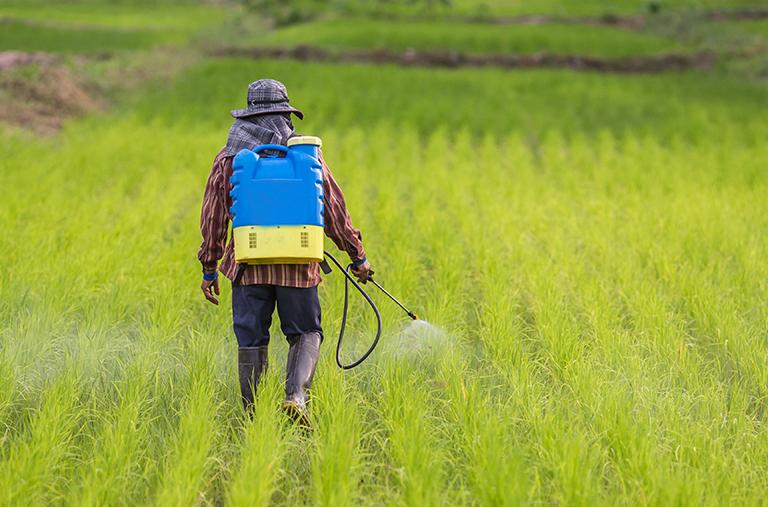Paraquat herbicide is a weed and grass-killer that has been linked to Parkinson’s disease. Lawsuits are being filed alleging that Syngenta and others involved in the Paraquat product are liable for the herbicide contributing to the development of Parkinson’s disease.

What is Paraquat?
Paraquat is a toxic chemical that is widely used as a herbicide, primarily for weed and grass control. The Environmental Protection Agency (EPA) classifies paraquat as “restricted use.” This means that it can be used only by people who are licensed applicators. Paraquat is marketed under various trade names including Gramoxone, Para-SHOT, Parazone, Quick-Quat, Firestorm, Helmquat and more.
Paraquat was first introduced as a commercial product in 1961. It is used by farmers several times a year to control weeds in crop areas. Crops that are sprayed with Paraquat herbicide include orchard crops, row crops, fruits and vegetables. It’s usage has seen a very large increase due to the rise in Roundup lawsuits, as well as growth of glyphosate-resistant weeds.
In 2009 and 2011 a study was released on Paraquat. In this study there was an investigation into the relationship between Parkinson’s disease and the exposure to herbicides and pesticides that are toxic to nervous tissue areas. This study found that people who used the Paraquat product developed Parkinson’s disease at least 2 times more than others that do not use it. It was also revealed that any exposure to Paraquat within 1600 feet of a home resulted in an increase in Parkinson’s disease risk of 75%. This was a very influential study even among those who were skeptical of the connection between Paraquat and Parkinson’s.
In 2017, the first lawsuit was filed against Syngenta and Growmark, the manufacturers of paraquat. The complaint was filed on behalf of farmers and agricultural workers who had developed Parkinson’s disease after being exposed to paraquat.
On May 23, 2018, a University of Guelph professor in the Department of Molecular and Cellular Biology, published a study in which he determined that low-level exposure to pesticides like Paraquat disrupt cells in a way that mimics the effects of mutations known to cause Parkinson’s disease. He believes that safety standards need to be updated to protect those who are more likely to develop Parkinson’s after pesticide exposure and may not even know it. Currently, there is no cure or therapy to slow, stop or reverse the progression of Parkinson’s disease. The exact cause of the disease is unknown, but research points to a combination of genetic and environmental factors.
Syngenta Trade Names
Syngenta is the world’s largest agrichemical corporation and sells Paraquat herbicides under the trade name Gramoxone. It is produced in many countries under various trade names, such as:
- Gramoxone
- Paraquat Concentrate
- Blanco
- Cyclone SL 2.0
- Firestorm
- Helmquat 3SL
- Bonedry
- Devour
- Para-Shot 3.0
Parkinson’s disease
Parkinson’s disease (PD) is a type of movement disorder that occurs when nerve cells in the brain don’t produce enough of a brain chemical called dopamine. Some cases of Parkinson’s are genetic, but most cases do not seem to run in families. Exposure to chemicals like paraquat might play a role in development of the disease.
Symptoms of Parkinson’s disease tend to begin gradually, often on one side of the body. Later they affect both sides. These symptoms include:
- Trembling of hands, arms, legs, jaw and face
- Stiffness of the arms, legs and trunk
- Slowness of movement
- Poor balance / coordination
Other Symptoms of Paraquat Exposure:
- Shortness of breath
- Vomiting
- Abdominal pain
- Mucosal lesions of mouth and tongue
- Dermatitis
- Hypotension
- Tachypnoea
- Hypoxia
- Dehydration
Those most at risk of developing Parkinson’s as a result of Paraquat exposure include farm workers, landscapers, nursery workers, and others in occupations that require frequent use of herbicides on crops. People who use Paraquat for their own home gardens and lawns are also at risk, if they have used the herbicide regularly. You could be exposed due to ingestion, prolonged skin exposure, inhalation, accidental exposure, and occupational exposure.
We will help you seek justice
Lawsuits are being filed alleging that Syngenta and others involved in the process of manufacturing, marketing, and distributing paraquat are liable for causing or contributing to the development of Parkinson’s disease. If you or a loved one developed Parkinson’s or other serious side effects resulting from paraquat exposure, filing a lawsuit could help pay for medical bills, lost wages, and lost earning capacity. Pursuing a claim will also encourage herbicide manufacturers to fully test their products before releasing them on the market, and to stop selling dangerous products altogether.
If you’ve been injured from use of Paraquat Herbicide, call us today for your free consultation to discuss your rights. Chhabra, Gibbs & Gustavis, P.A. are Mississippi Attorneys that are here for you.

